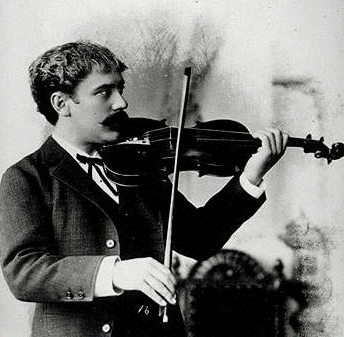 |
| Image from Wikipedia |
He was the son of an Army band leader, and (like many of the composers we've seen here) showed musical aptitude at a very young age. He gave his first concert at age 8 and impressed a wealthy patron who financed his musical education which culminated at the Paris Conservatory. He was influential early on, as the Spanish flavor of his works quickly became popular.
Interestingly, he was quite famous in his day: Arthur Conan Doyle had Sherlock Holmes and Dr. Watson attend a concert by him, and Edith Wharton's The Age Of Innocence includes a scene with the main character being invited to a private recital by Sarasate.
This performance is by Julian Rachlin, Nikolaj Znaider, and Sophie Rachlin at the Tchaikovsky Conservatory, Moscow.
Happy birthday, Pablo! Born this day in 1844.
2 comments:
James Michener talked exhaustively of Spanish classical music in his monumental tribute to Spain, Iberia. He was puzzled that Spain never produced the equivalent of a Verdi or the other Nationalist composers you have already mentioned, and concluded that it had to do with the loss of Spain's prestige following the collapse of the Golden Age and the turning inward that resulted. Spain also developed music traditions that other countries didn't, specifically the Zarzuela, which is a light genre that incorporates song, dance, and spoken word (it's also the word for a popular Spanish seafood dish). Many of the men who might have composed major classical works were instead writing zarzuelas for strictly Spanish consumption.
Michener did fall in love with the works of a much earlier Spanish Composer, Tomas Luis de Victoria, who was one of the greatest composers of the Renaissance/counter-reformation. Michener was especially impressed by Victoria's requiem mass, which is indeed a masterwork.
It sure sounds Spanish, another new guy for me.
Post a Comment